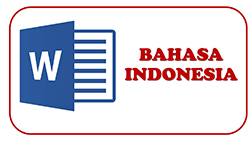Pengaruh Model Pembelajaran Literasi, Orientasi, Kolaborasi, dan Refleksi Terhadap Keterampilan Literasi Sosial Budaya dan Pemahaman Moderasi Beragama Siswa
Abstract
This research aims to see the effect of the LOK-R (Literasi, Orientasi, Kolaborasi, dan Refleksi) learning model on improving students' socio-cultural literacy skills and understanding of religious moderation in social science learning. This research is quasi-experimental with a pretest-posttest control group design. The research population was students at MTs Putra Putri Simo, Lamongan. The research sample consisted of 8th grade students, consisting of 60 students, with 30 people in the experimental class and 30 people in the control class. The research instrument is in the form of pretest questions, which are carried out before implementing the LOK-R learning model to measure initial socio-cultural literacy skills and initial understanding of religious moderation in students. The results of the research and hypothesis testing show that: (1) there has been a significant increase in students' socio-cultural literacy skills using the LOK-R learning model; (2) there has been a significant increase in students' understanding of religious moderation using the LOK-R learning model; and (3) there are differences in socio-cultural literacy skills and understanding of religious moderation simultaneously between students who take part in learning using the LOK-R learning model and students who take part in learning using the guided inquiry learning model. So it is concluded that there is an influence of using the LOK-R learning model has an influence on improving socio-cultural literacy skills and understanding of religious moderation among students in social studies learning at MTs Putra Putri Simo, Lamongan.
Downloads
References
Ayuningtyas, R., Hermawan, R., & Mulyasari, E. (2021). Model Scafolding Writing Berbasis Studi Kasus Untuk Meningkatkan Pengetahuan Moral Sosial Budaya ada Siswa SD di Bandung. Jurnal Pendidikan Guru Sekolah Dasar, 6(2), 94–104.
Budiono, B. (2021). Urgensi Pendidikan Multikultural Dalam Pengembangan Nasionalisme Indonesia. Jurnal Civic Hukum, 6(1), 79–89.
Cook-Gumperz, J. (2006). The Social Construction of Literacy. In Cambridge. Cambridge University Press.
Delors, J. (2013). The treasure within: Learning to know, learning to do, learning to live together and learning to be. What is the value of that treasure 15 years after its publication? International Review of Education, 59(3), 319–330. https://doi.org/10.1007/s11159-013-9350-8
Dhesita, S. J. (2022). Analisis Penerapan Model Pembelajaran LOK-R Terhadap Kemampuan Literasi Siswa Dalam Pembelajaran SejaraH. Jurnal Ilmiah UNY, Vol. 4, No, 210–226. https://doi.org/10.21831/jwuny.v4i2.54519
Edwards, S. (2007). From developmental-constructivism to socio-cultural theory and practice: An expansive analysis of teachers’ professional learning in early childhood education. Journal of Early Childhood Research, 5(1), 83–106. https://doi.org/10.1177/1476718X07072155
Ginanjar, A. (2016). Penguatan Peran Ips Dalam Meningkatkan Keterampilan Sosial Peserta Didik. Jurnal Harmony, 1(1), 118–126.
Hasbi, M., & Rahman, A. (2022). Ektremism Ke Konflik : Kerangka Konsep Mekanisme Konflik Beragama. July.
Islam, K. N. (2020). Moderasi Beragama di Tengah Pluralitas Bangsa: Tinjauan Revolusi Mental Perspektif Al-Qur’an. Kuriositas: Media Komunikasi Sosial Dan Keagamaan, 13(1). https://doi.org/10.35905/kur.v13i1.1379
Janah, M. (2018). Peningkatan Keterampilan Sosial Peserta Didik SMA Menggunakan Layanan Bimbingan Kelompok Dengan Teknik Diskusi Laila Maharani, Hardiyansyah Masya,. 05(1), 65–72.
Kemenag. (2021). Indeks Kerukunan Umat Beragama Tahun 2021 Masuk Kategori Baik.
Marlina, T., & Halidatunnisa, N. (2022). Implementasi Literasi Sosial Budaya Di Sekolah Dan Madrasah. Al-Madrasah: Jurnal Pendidikan Madrasah Ibtidaiyah, 6(2), 426. https://doi.org/10.35931/am.v6i2.1002
Musdalifah, I., Andriyani, H. T., Krisdiantoro, K., Putra, A. P., Aziz, M. A., & Huda, S. (2021). Moderasi Beragama Berbasis Sosio Kultural pada Generasi Milenial Desa Balun Kecamatan Turi Kabupaten Lamongan. Sosial Budaya, 18(2), 122. https://doi.org/10.24014/sb.v18i2.15437
Nisa’, R., & Khozain, N. (2023). Development of Android-Based Indonesian Cultural Exploration Educational Game for Madrasah Ibtidaiyah Students . Mudarrisa: Jurnal Kajian Pendidikan Islam, 15(2), 243–268. https://doi.org/10.18326/mudarrisa.v15i2.550
Nisa’, Rofiatun. (2019). Internalisasi Pendidikan Karakter dalam Gerakan Literasi Berbasis Kearifan Lokal . Cendekia, 11(1), 11-18 https://doi.org/10.37850/cendekia.v11i1.89
Prasojo, Z. H., & Pabbajah, M. (2020). Akomodasi Kultural Dalam Resolusi Konflik Bernuansa Agama Di Indonesia. Aqlam: Journal of Islam and Plurality, 5(1). https://doi.org/10.30984/ajip.v5i1.1131
Rifky, S., Putra, J. M., Ahmad, A. T., Widayanthi, D. G. C., Abdullah, G., Sunardi, S., ... & Syathroh, I. L. (2024). Pendidikan Yang Menginspirasi: Mengasah Potensi Individu. Yayasan Literasi Sains Indonesia.
Segara, N. B., Alwi, Z., Huriyah, L., Musyaropah, A. R., Saifuddin, S., & Bisri, S. S. (2022). Teacher’s Perception: Designing Step-by-Step LOC-R (Literacy, Orientation, Collaboration, Reflection) in Sociocultural Literacy Teaching. Proceedings of the International Conference on Madrasah Reform 2021 (ICMR 2021), 633(Icmr 2021), 173–177. https://doi.org/10.2991/assehr.k.220104.026
Urbayatun, S., Maryani, E., Bhakti, C. P., Sulisworo, D., & Suyatno. (2018). Komunikasi Pedagogik Guru dalam Pengembangan LIterasi SMIC. Kalika.





.png)










